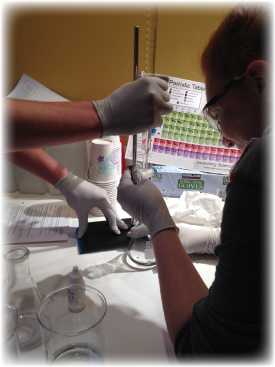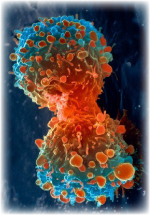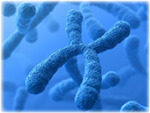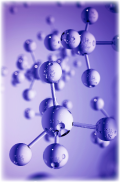|
Online Courses in SCIENCE
Honors Chemistry With Lab
 At HS College-Bound my daughter has taken At HS College-Bound my daughter has taken
three years of science:
— Physical Science and Ecology
— Honors Biology With Lab
— Honors Chemistry With Lab
Thanks to Diane Speed's excellent, inspiring teaching, my daughter has discovered a passion for science, truly engaging with the material and demonstrating an impressive, lasting understanding of the concepts. I am very happy with my daughter's experiences and a little jealous as well — I wish that in the top-rated high school I attended my own science teachers and classes had been this good.
— Homeschooling mom
I have to say you are the coolest science teacher — no one ever gave me a piece of sodium to drop in water when I took chemistry in high school. My daughter got to cut it, drop each piece into the water, and watch it skitter around the surface.
We were both excited to do the electrolysis experiment with pH indicator as well — something else I never did in school.
Thanks again for giving both of us new experiences in science!
— Homeschooling dad
Few chemistry courses do what this one does:
- It sets a deep & solid foundation for students who will go on to study chemistry at the university level.
- It instills in students a real love of the subject through careful, in-depth study.
- It provides real labs and teaches students to write real lab reports.
- It features independent research projects — both to deepen students' learning and to give them experience with researching & writing term papers and making presentations.
In this class each student acquires both a deep understanding of chemistry and an appreciation for its real-world applications. Each week comprises lecture and discussion enhanced by video, graphics, and PowerPoint presentations, with a lab session approximately every other week. Students are also provided with lab materials, labs, and worksheets to be completed at home.
 Among the topics covered in this course: Among the topics covered in this course:
- the scientific method;
- significant digits;
- properties of matter;
- atomic theory;
- the periodic table of elements;
Texts & other items to purchase
Here are the items needed for Honors Chemistry with Lab — The first three links below are to the correct editions on Amazon; the link to a calculator is for a model suitable for this class.
Your student will also need a notebook or binder with loose leaf paper (for taking notes in class) and a section for various handouts.
Additional reading:
- Lewis Dot Diagrams;
- bonding—covalent & ionic, polarity;
- properties of water;
- compounds;
- solutions;
- separating mixtures;
- distillation;
- stoichiometry;
- limited reactants and percent yield;
- the mole;
- mole conversions;
- molecular geometry;
- pH, acids, bases and salts (buffers);
- redox reactions;
- ions;
- gas laws.
This honors-level class moves at quite a clip. Students will be expected to complete four to five hours of work at home each week. Homework will consist of reading, annotating text, watching videos, completing worksheets, doing independent research, writing lab reports, and studying.
Class activities:
- Students will interact with the teacher and other students via our classroom platform, asking and answering questions.
- Students will conduct research projects independently. Students report their findings to the class by making online presentations online.
- Periodic quizzes will be administered and reviewed. The objective of these quizzes will be learning and mastering the content, not generating a grade. Students may use the quizzes as a study guide.
- Five tests will be provided to parents to administer at home as they wish: open book, closed book, as a learning tool, as a grade generator, or any combination.
 Among our labs are the following: Among our labs are the following:
- Safety in the Lab;
- Measurement;
- Density vs. Weight;
- Electron-shells modeling;
- Quantum numbers & electron orbitals;
- Electron configurations;
- Periodic law;
- Finding the missing element (Periodic table);
- Designing your own periodic table;
- Differential solubility;
- Nomenclature: Compounds;
- Solubility: Solvent/Solute Interaction;
- Simulation: Molecular Polarity;
- Simulation: Molecular Geometry;
- Examining Oxidation States;
- Determining the Formula of a Hydrate;
- Observing a single-displacement reaction;
- Observing the Volume-Pressure Relationship of Gases;
- Observing the Volume-Temperature Relationship of Gases.
Prerequisites
It is recommended that students complete Algebra I before taking this class.
About the instructor
Diane Speed is the founder of The Classical Kids Network and co-founder of HS College-Bound. She has a B.S. in biology from Drexel University, as well as a minor in chemistry. Before marrying, Diane worked in laboratories at SmithKline Pharmaceuticals (antibiotic development), Temple University Research labs (hemophilia/clotting factors), and the Philadelphia Water Department (water purity). Diane has been teaching science to homeschooled highschoolers since 2013.
|
|
|
2026 registration is now open!
FALL 2026 – SPRING 2027
All sessions live & interactive
Students attend three classes
per week, beginning August 25:
Tuesdays 12:00 – 1:00 pm EST
Wednesdays 12:00 – 1:00 pm EST
Fridays 12:00 – 1:00 pm EST
To register a student, click here:

To contact the instructor, click here.
Fee for entire year: $ 1398.
plus Lab kit (required): $ 195.
Up to July 15:
Register with a deposit.
Now through July 15, 2026, secure your student's seat with a 50% deposit
of the course fee ($ 699.);
the balance is due on September 1, 2026
(we'll invoice you, and the charge for your lab kit, which includes shipping anywhere in the U.S., will be added).
After July 15:
Pay in full.
The entire fee, plus lab kit, is
due at registration.
View our weekly schedule
for 2026–27
 Unlike AP courses, which move through topics quickly and in a superficial manner, this course aims for real depth and vital skills. The instructor's aim is threefold: 1) to train her students in real scientific thinking; 2) to impart deep understanding of the subject; 3) to foster their love of science. Unlike AP courses, which move through topics quickly and in a superficial manner, this course aims for real depth and vital skills. The instructor's aim is threefold: 1) to train her students in real scientific thinking; 2) to impart deep understanding of the subject; 3) to foster their love of science.
Many biology courses are asynchronous or meet just one hour per week. Our course, by contrast, meets three times per week. The reason: It is our conviction that in a science course, students should interact with and ask questions of a live instructor. We consider live interactions with the instructor vital to deepening students' understanding, correcting any misapprehensions, and cultivating real engagement.
 Our online science intensives are eight weeks long; each delivers in-depth, focused study of a particular topic in science, and they all include labs. Each is a standalone course that may complement nicely your at-home science curriculum. But you may also combine two or more intensives in whatever way suits your student's interests and needs. — You can even fashion a robust year-long science course complete with labwork. Our online science intensives are eight weeks long; each delivers in-depth, focused study of a particular topic in science, and they all include labs. Each is a standalone course that may complement nicely your at-home science curriculum. But you may also combine two or more intensives in whatever way suits your student's interests and needs. — You can even fashion a robust year-long science course complete with labwork.
> > > more
Our approach to ...
Science
 Sciences at HS College-Bound aim high. Our courses employ college texts, websites from universities, AP-level labs, and in-depth explorations. All content is taught by subject-matter experts who are passionate about their disciplines. Sciences at HS College-Bound aim high. Our courses employ college texts, websites from universities, AP-level labs, and in-depth explorations. All content is taught by subject-matter experts who are passionate about their disciplines.
At the same time, we provide in-depth studies of the discipline for two kinds of students:
- those new to the formal study of science;
- those who have already studied science deeply for years.
In order to ensure learning and mastery of concepts, moreover, the content is taught in a tiered fashion — laying foundational concepts, building up knowledge, delving deep into the facts, and reinforcing by looping back to essential concepts covered earlier in the course.
These methods ensure that no student is left behind. Rather, students come away with a full picture of the science and the interconnectedness of topics. Students with more science acumen can learn deeply while students new to the discipline learn comprehensively.
A more detailed look at our methods:
- Multimedia. Our science courses are taught primarily through lecture, targeted activities, and readings. But all these methods are supplemented by video, images, or animations whose purpose is to depict processes and events that are sometimes invisible and often liable to seem abstract — like cellular activity, chemical compounds, biochemical and physical processes, etc.
- Research projects. Students are assigned in-depth research projects to deepen their understanding of the history of science and the development of scientific knowledge. All students are required to present in class and online.
- Labs. All labs correlate to class content, and depending on the course, we run anywhere from five to eight lab sessions per semester. Students use the scientific method to analyze data and draw conclusions in written reports.
- Tests. Tests are provided to parents to administer at home as they wish — open book, closed book, as a learning tool, as a grade generator, or any combination.
- Homework. Typically four to five hours of per week — reading, annotating text, watching videos, completing worksheets, doing independent research, writing lab reports, and studying.
|
|
![]()